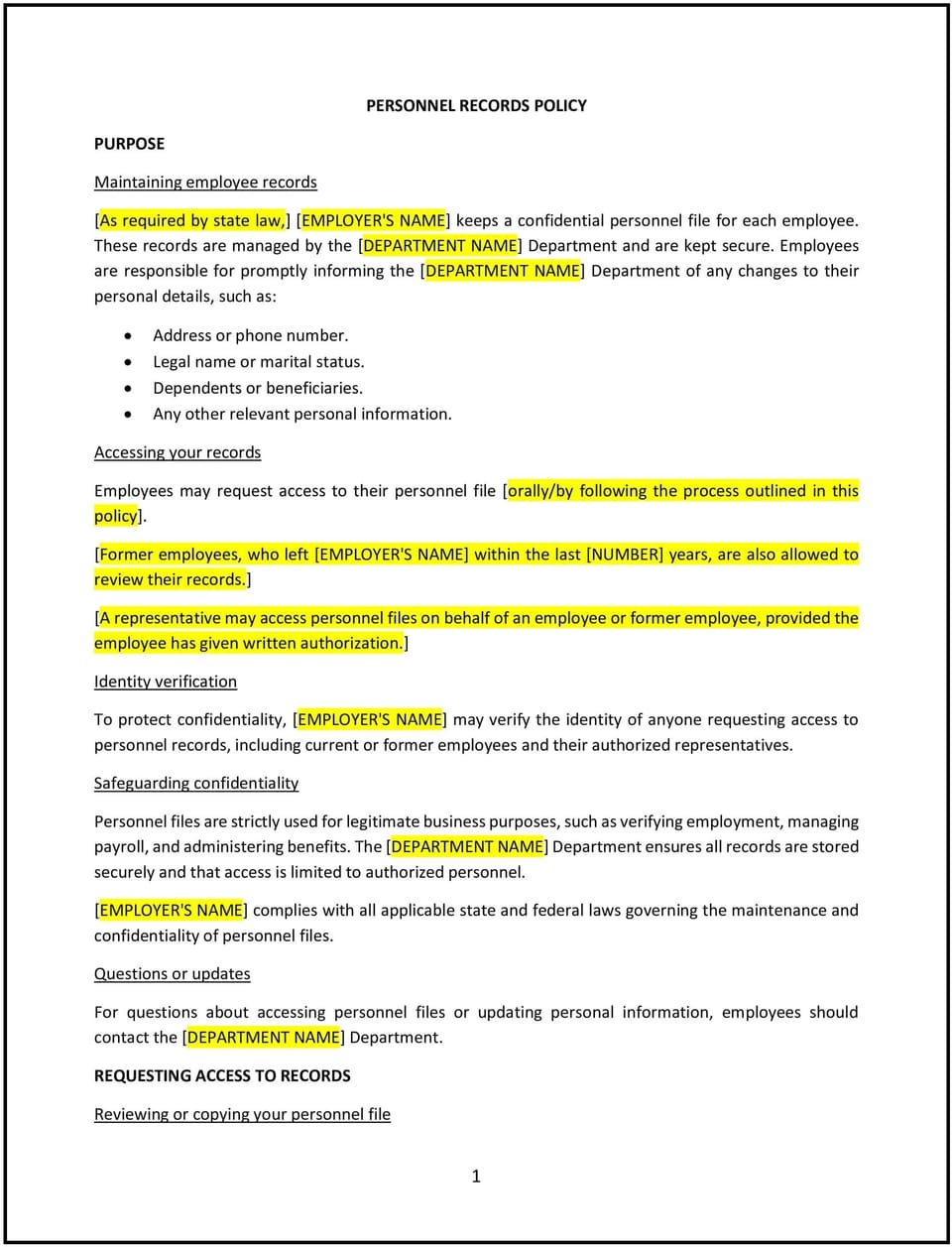Personnel records policy (Arkansas): Free template

Personnel records policy (Arkansas)
In Arkansas, a personnel records policy provides businesses with guidelines for maintaining, accessing, and managing employee records. This policy ensures the confidentiality, accuracy, and compliance of personnel records while protecting sensitive employee information.
This policy outlines the types of records maintained, employee access rights, and procedures for securely handling and disposing of records. By implementing this policy, Arkansas businesses can protect employee privacy, manage records efficiently, and support compliance with applicable state and federal regulations.
How to use this personnel records policy (Arkansas)
- Define record types: Specify the categories of personnel records maintained, such as employment history, performance evaluations, and benefits information.
- Establish access controls: Clearly state who is authorized to access personnel records and under what circumstances.
- Outline employee rights: Provide guidelines for how employees can review their records and request corrections to inaccurate information.
- Ensure secure storage: Implement protocols for securely storing and transferring records, whether physical or electronic.
- Address record retention: Include retention schedules and disposal procedures to ensure records are managed in compliance with Arkansas and federal laws.
Benefits of using this personnel records policy (Arkansas)
This policy offers several advantages for Arkansas businesses:
- Protects employee privacy: Safeguards sensitive information, fostering trust and minimizing risks of unauthorized access.
- Supports compliance: Aligns with Arkansas-specific and federal regulations on personnel records, reducing legal risks.
- Enhances recordkeeping efficiency: Establishes clear procedures for maintaining, accessing, and disposing of records.
- Promotes accountability: Provides a structured framework for handling employee records consistently and fairly.
- Reduces risks: Mitigates potential disputes related to record accuracy or confidentiality breaches.
Tips for using this personnel records policy (Arkansas)
- Address Arkansas-specific considerations: Reflect state laws governing personnel record retention, access, and confidentiality in the policy.
- Train managers and HR staff: Educate those responsible for handling records on proper storage, access protocols, and legal requirements.
- Use secure systems: Implement robust security measures, such as encryption and password protection, for electronic records.
- Conduct regular audits: Periodically review recordkeeping practices to ensure compliance with the policy and identify potential improvements.
- Update regularly: Revise the policy to reflect changes in laws, technology, or business practices.
Q: How does this policy benefit the business?
A: This policy ensures secure and efficient management of personnel records, supports compliance with Arkansas and federal laws, and protects employee privacy.
Q: What types of personnel records should the business maintain?
A: Personnel records may include employment contracts, payroll information, performance reviews, disciplinary actions, and benefits enrollment forms.
Q: How does this policy support compliance with records regulations?
A: The policy aligns with state and federal requirements for maintaining, storing, and disposing of employee records lawfully and securely.
Q: What steps should the business take to ensure record accuracy?
A: The business should allow employees to review their records periodically and request corrections for inaccuracies, following the procedures outlined in the policy.
Q: How can the business securely dispose of personnel records?
A: The business should follow secure disposal methods, such as shredding physical documents and permanently deleting electronic files, in compliance with legal retention requirements.
This article contains general legal information and does not contain legal advice. Cobrief is not a law firm or a substitute for an attorney or law firm. The law is complex and changes often. For legal advice, please ask a lawyer.


